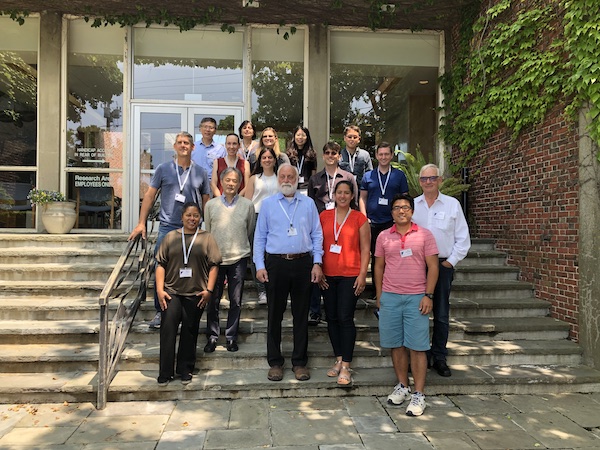Summary
Recent literature has highlighted several ongoing challenges regarding the consistency of seawater CO2 measurements with estimates from alternate input pairs. These gaps in our knowledge of the ocean carbonate system are probably related to carbonate constant uncertainties, frequently-unknown concentrations of organic bases in seawater, and unrecognized measurement uncertainties. CO2 measurement intercomparability is also challenged by the large and growing variety of instruments and approaches used for measurements and the lack of robust assessments or certified reference materials for some methods. While measurement strategies diversify and evolve, the need remains for consistent records of key measurements over time to assess marine CO2 cycling and its impacts: e.g. dissolved inorganic carbon (DIC) records for anthropogenic carbon storage and changes in the biological pump, partial pressure of CO2 (pCO2) records for air-sea CO2 flux estimates, pH records for ocean acidification (OA) monitoring, and seawater alkalinity (AT) records for assessing the impacts of OA on carbonate mineral cycling. It is therefore more critical than ever that scientists develop a strategy for identifying and addressing carbonate system intercomparability uncertainties, thus enabling existing and future data to be reconciled into internally-consistent data products with associated uncertainties. We therefore propose a forum between experts in carbonate system parameter measurements, data documentation, and interconversion to debate the nature of the problems, advocate for needed research to resolve these problems, and provide guidance for data product assembly and documentation.
Working Group Products
Carter, B. R., J. D. Sharp, M. I. García-Ibáñez, R. J. Woosley, M. B. Fong, M. Álvarez, L. Barbero, S. L. Clegg, R. Easley, A. J. Fassbender, X. Li, K. M. Schockman, Z. A. Wang (2024). Random and systematic uncertainty in ship-based seawater carbonate chemistry observations. Limnolog. Oceanogr. https://doi.org/10.1002/lno.12674
Carter, B.R., Sharp, J.D., Dickson, A.G., Álvarez, M., Fong, M.B., García-Ibáñez, M.I., Woosley, R.J., Takeshita, Y., Barbero, L., Byrne, R.H., Cai, W.-J., Chierici, M., Clegg, S.L., Easley, R.A., Fassbender, A.J., Fleger, K.L., Li, X., Martín-Mayor, M., Schockman, K.M. and Wang, Z.A. (2023), Uncertainty sources for measurable ocean carbonate chemistry variables. Limnol Oceanogr. https://doi.org/10.1002/lno.12477. Wiley top cited article in 2023!
OCB workshop report: Ocean Carbonate System intercomparison Forum
The first of two OCB-funded meetings was held in Woods Hole, MA, June 22-23, 2019 by a team of researchers working on identifying the largest remaining challenges for internal consistency of the carbonate system in seawater. Discussion primarily focused on disagreements between measured and calculated seawater pH and on proposing efforts aimed at identifying the source of the disagreements. An inter-laboratory comparison experiment is being planned for the beginning of 2020 that will isolate aspects of seawater pH measurement practices, for example by providing a common purified dye for measurements by all groups and a reference material that is more strongly buffered and less strongly temperature sensitive than alternatives. Other major topics of debate included:
- the need for standard distributable purified m-Cresol purple dye,
- the feasibility of creating reference materials seawater pH,
- the importance of routine measurement of non-certified reference materials for pH,
- the inter-consistency of the other aspects of the carbonate system (beyond pH),
- the need for additional independent discrete pCO2 measurements,
- the need for a refinement to the boron-to-salinity ratio in seawater,
- the need for a refinement to the carbonate system equilibrium coefficients,
- best practices for inter-cruise comparisons during data product assembly in light of apparent inter-consistency challenges (i.e. recommendations for GLODAPv2),
- many aspects of measurement practices that could be leading to observed or potential inter-consistency challenges (e.g. errors in the pressure dependence of carbonate constants)
- and ways to make certified reference materials and purified (or well-characterized) dyes more broadly and inexpensively available.
Working Group Members

Brendan Carter (Lead) - NOAA Pacific Marine Environmental Laboratory
Marta Álvarez - Instituto Español de Oceanografia
Leticia Barbero - NOAA Atlantic Oceanographic and Meteorological Laboratory
Robert Byrne - University of South Florida
Wei-Jun Cai - University of Delaware
Melissa Chierici - Institute of Marine Research
Andrew Dickson - Scripps Institution of Oceanography
Regina Easley - National Institute of Standards and Technology
Andrea Fassbender - Monterey Bay Aquarium Research Institute
Akihiko Murata - Japan Agency for Marine-Earth Science and Technology
Yui Takeshita - Monterey Bay Aquarium Research Institute
Aleck Wang - Woods Hole Oceanographic Institution
Ryan Woosley - Massachusetts Institute of Technology



